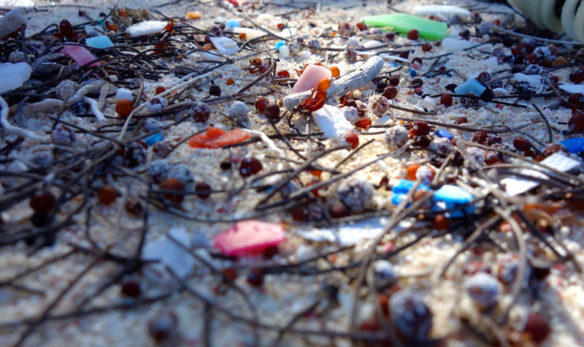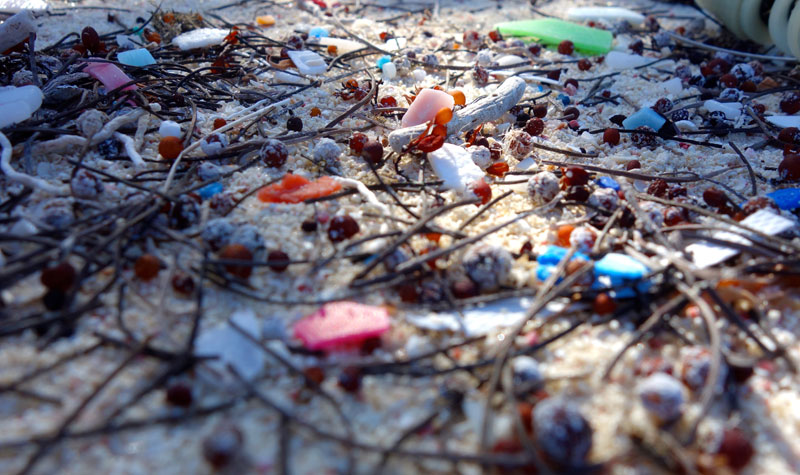
“When plastic ingestion occurs, it blocks the digestive tract, gets lodged in animals windpipes cutting airflow causing suffocation, or fills the stomach, resulting in malnutrition, starvation and potentially death. Indeed, it is found that debris often accumulates in the animals’ gut and give a false sense of fullness, causing the animal to stop eating and slowly starve to death.” —Captions and Photo: © SAF — Coastal Care
Excerpts;
Scientists have long known that marine animals mistakenly eat plastic debris because the tiny bits of floating plastic might look like prey.
But a new Duke University study of plastic ingestion by corals suggests there may be an additional reason for the potentially harmful behavior. Visual cues, such as a resemblance to prey, don’t factor into the appeal, the researchers noted, because corals have no eyes.
The plastic just plain tastes good.
Corals in our experiments ate all types of plastics but preferred unfouled microplastics by a threefold difference over microplastics covered in bacteria,” said Austin S. Allen, a PhD student at Duke’s Nicholas School of the Environment. “This suggests the plastic itself contains something that makes it tasty.”
“Ultimately, the hope is that if we can manufacture plastic so it unintentionally tastes good to these animals, we might also be able to manufacture it so it intentionally tastes bad,” Seymour said. “That could significantly help reduce the threat these microplastics pose…”
Read Full Article; Duke University (10-24-2017)
Video captures moment plastic enters food chain, BBC News (03-11-2017)
A scientist has filmed the moment plastic microfibre is ingested by plankton, illustrating how the material is affecting life beneath the waves. The footage shows one way that plastic waste could be entering the marine and global food chain…
Brain damage in fish from plastic nanoparticles in water, Science Daily (09-25-2017)
A new study shows that plastic particles in water may end up inside fish brains. The plastic can cause brain damage, which is the likely cause of behavioral disorders observed in the fish…
New UN report finds marine debris harming more than 800 species, costing countries millions; United Nations (12-05-2016)
Marine debris is negatively affecting more than 800 animal species and causing serious losses to many countries’ economies, according to a United Nations report launched December 5th, 2016…
The Plastic Found In a Single Turtle’s Stomach, Independent UK (03-24-2011)
Whale found dying off coast of Norway with 30 plastic bags in its stomach; Telegraph UK (02-03-2017)
90 Percent of Seabirds Have Plastic in Their Stomachs, Newsweek (09-01-2015)
By 2050, nearly all seabirds will have plastic in their stomachs. Already, 9 out of 10 of the birds have some of the substance in their digestive tracts. Such are the sobering conclusions of a study published August 31 in the journal Proceedings of the National Academy of Sciences…
Kenya: Marine debris threaten to suffocate sea animals; The Star Kenya (01-24-2017)
Marine researchers spotted a dolphin suffocating in a plastic bag last week in Watamu, Kenya. The incident, the first to be witnessed there, has raised concern on the safety of the millions of sea animals in the Indian Ocean waters due to the increased cases of plastic waste.
“Midway.” A Love Story for our Time from the Heart of the Pacific”—By Chris Jordan, Midway Film; (04-01-2015)
A shocking film from Midway Island in the North Pacific Ocean, by Midway Film.
Plastic Pollution / When The Mermaids Cry: The Great Plastic Tide, Coastal Care ©-2009.
“The unprecedented plastic waste tide plaguing our oceans and shores, can become as limited as our chosen relationship with plastics, which involves a dramatic behavioral change on our part…”









